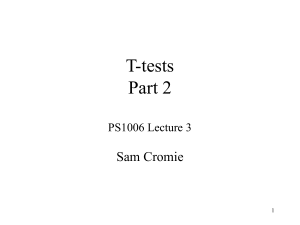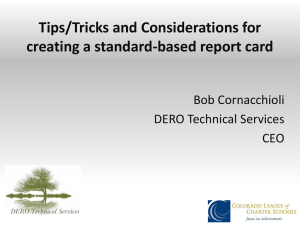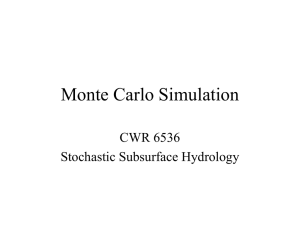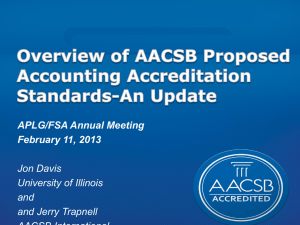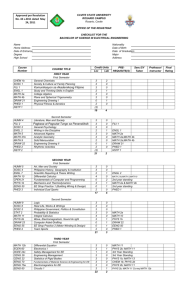Intro to VHDL
advertisement
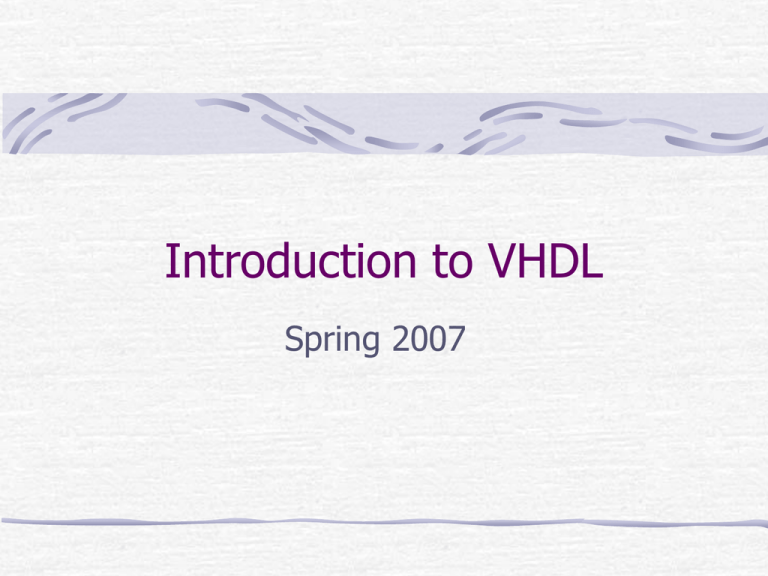
Introduction to VHDL Spring 2007 Introduction VHDL – VHSIC (Very high speed integrated circuit) Hardware Description Language. Originally developed by DoD for specifying digital system. VHDL is an IEEE standard specification language (IEEE 1164). EENG 2920 Digital Systems Design Uses Description of complex digital circuits. Modeling the behavior of complex circuit so that it’s operation could be simulated. Input to design entry in CAD systems thereby reducing the time to complete design cycle. EENG 2920 Digital Systems Design Features of VHDL Technology/vendor independent Reusable Portable EENG 2920 Digital Systems Design Features of program 1. 2. 3. 4. 5. 6. VHDL is not case sensitive All names should start with an alphabet character (a-z or A-Z) Use only alphabet characters (a-z or A-Z) digits (0-9) and underscore (_) Do not use any punctuation or reserved characters within a name (!, ?, ., &, +, -, etc.) Do not use two or more consecutive underscore characters (__) within a name (e.g., Sel__A is invalid) All names and labels in a given entity and architecture must be unique EENG 2920 Digital Systems Design Features of program Comments are indicated with a double-dash. The carriage return terminates a comment. No formatting conventions imposed by VHDL compiler. Example: if (a=b) then or if (a=b) then or if (a = b) then are all equivalent EENG 2920 Digital Systems Design VHDL MODEL A complete VHDL component description consists of an Entity and an Architecture. Entity – Describes a component’s interface. Architecture – defines a component’s function. Architectural Description – Structural, behavioral (algorithmic and dataflow). EENG 2920 Digital Systems Design Entity Declaration • Entity Declaration describes the interface of the component, i.e. input and output ports. Entity name Port names Port type ENTITY nor_gate IS PORT( x : IN STD_LOGIC; y : IN STD_LOGIC; z : OUT STD_LOGIC ); END nor_gate; Reserved words Port modes EENG 2920 Digital Systems Design Semicolon No Semicolon Architecture Architecture describes an implementation of a design entity. Example of architectural implementation: ARCHITECTURE sample OF nor_gate IS BEGIN z <= x nor y; END sample; EENG 2920 Digital Systems Design Complete VHDL Model nor_gate.vhd LIBRARY ieee; USE ieee.std_logic_1164.all; ENTITY nor_gate IS PORT( x : IN STD_LOGIC; y : IN STD_LOGIC; z : OUT STD_LOGIC); END nor_gate; ARCHITECTURE sample OF nand_gate IS BEGIN z <= x NAND y; END sample; EENG 2920 Digital Systems Design Port Modes • In: Data goes into the component and only appear on the right side of a signal or variable assignment. • Out: Values cannot be read into the component but can only be updated from within. It can only appear on the left side of a signal assignment. • Inout: Bi-directional port can be read and updated within the entity model. It can appear on both sides of a signal assignment. EENG 2920 Digital Systems Design Signals SIGNAL x : STD_LOGIC; x 1 wire SIGNAL y : STD_LOGIC_VECTOR(7 DOWNTO 0); y 8 bus EENG 2920 Digital Systems Design Standard Logic Vectors SIGNAL m: STD_LOGIC; SIGNAL n: STD_LOGIC_VECTOR(3 DOWNTO 0); SIGNAL o: STD_LOGIC_VECTOR(3 DOWNTO 0); SIGNAL p: STD_LOGIC_VECTOR(7 DOWNTO 0); SIGNAL q: STD_LOGIC_VECTOR(15 DOWNTO 0); SIGNAL r: STD_LOGIC_VECTOR(8 DOWNTO 0); ………. m <= ‘0’; n <= ”0000”; -- Binary base assumed by default o <= B”0000”; -- Binary base explicitly specified p <= ”0110_0111”; -- You can use ‘_’ to increase readability q <= X”BF74”; -- Hexadecimal base r <= O”745”; -- Octal base EENG 2920 Digital Systems Design Vectors and Concatenation SIGNAL x: STD_LOGIC_VECTOR(3 DOWNTO 0); SIGNAL y: STD_LOGIC_VECTOR(3 DOWNTO 0); SIGNAL z, m, n: STD_LOGIC_VECTOR(7 DOWNTO 0); a <= ”0000”; b <= ”1111”; c <= a & b; -- c = ”00001111” m <= ‘1’ & ”0001111”; -- d <= ”10001111” n <= ‘1’ & ‘1’ & ‘0’ & ‘0’ & ‘1’ & ‘1’ & ‘1’ & ‘1’; -- e <= ”11001111” EENG 2920 Digital Systems Design VHDL Design Styles VHDL Design Styles dataflow Concurrent statements structural Components and interconnects behavioral Sequential statements • Registers • State machines • Test benches EENG 2920 Digital Systems Design Example – xor3 EENG 2920 Digital Systems Design Entity xor3 ENTITY xor3 IS PORT( X, Y, Z : IN STD_LOGIC; R : OUT STD_LOGIC ); end xor3; EENG 2920 Digital Systems Design Dataflow Architecture (xor3 gate) ARCHITECTURE dataflow OF xor3 IS SIGNAL m_sig: STD_LOGIC; BEGIN m_sig <=X XOR Y; R <= m_sig XOR Z; END dataflow; m_sig EENG 2920 Digital Systems Design Dataflow Description Gives a description of how data moves through the system and the various processing steps. Data Flow uses series of concurrent statements to realize logic. Order of data flow does not matter because concurrent statements are evaluated at the same time. Data Flow is most useful style when series of Boolean equations can represent a logic. EENG 2920 Digital Systems Design Structural Architecture (xor3 gate) ARCHITECTURE structural OF xor3 IS SIGNAL U1_OUT: STD_LOGIC; COMPONENT xor2 IS PORT( m : IN STD_LOGIC; n : IN STD_LOGIC; p : OUT STD_LOGIC ); END COMPONENT; BEGIN U1: xor2 PORT MAP (m => X, n => Y, p => m_sig); X Y XOR3 Z m_sig U2: xor2 PORT MAP (m => m_sig, n => z, p => R); END structural; EENG 2920 Digital Systems Design R Component and Instantiation (1) Named association connectivity COMPONENT xor2 IS PORT( m : IN STD_LOGIC; n : IN STD_LOGIC; p : OUT STD_LOGIC ); END COMPONENT; U1: xor2 PORT MAP (m => X, n => Y, p => m_sig); EENG 2920 Digital Systems Design Component and Instantiation (2) Positional association connectivity COMPONENT xor2 IS PORT( m : IN STD_LOGIC; n : IN STD_LOGIC; p : OUT STD_LOGIC ); END COMPONENT; U1: xor2 PORT MAP (X, Y, m_sig); EENG 2920 Digital Systems Design Structural Description Structural design is the simplest to understand is the closest to schematic capture and utilizes simple building blocks to compose logic functions. Components are interconnected in a hierarchical manner. Structural descriptions may connect simple gates or complex, abstract components. Structural style is useful when expressing a design that is naturally composed of subblocks. EENG 2920 Digital Systems Design Behavioral Architecture (xor3 gate) ARCHITECTURE behavioral OF xor3 IS BEGIN xor3_behav: PROCESS (X,Y,Z) BEGIN IF ((X XOR Y XOR Z) = '1') THEN R <= '1'; ELSE R <= '0'; END IF; END PROCESS xor3_behav; END behavioral; EENG 2920 Digital Systems Design Behavioral Description It accurately models what happens on the inputs and outputs of the black box (no matter what is inside and how it works). This style uses PROCESS statements in VHDL. EENG 2920 Digital Systems Design

